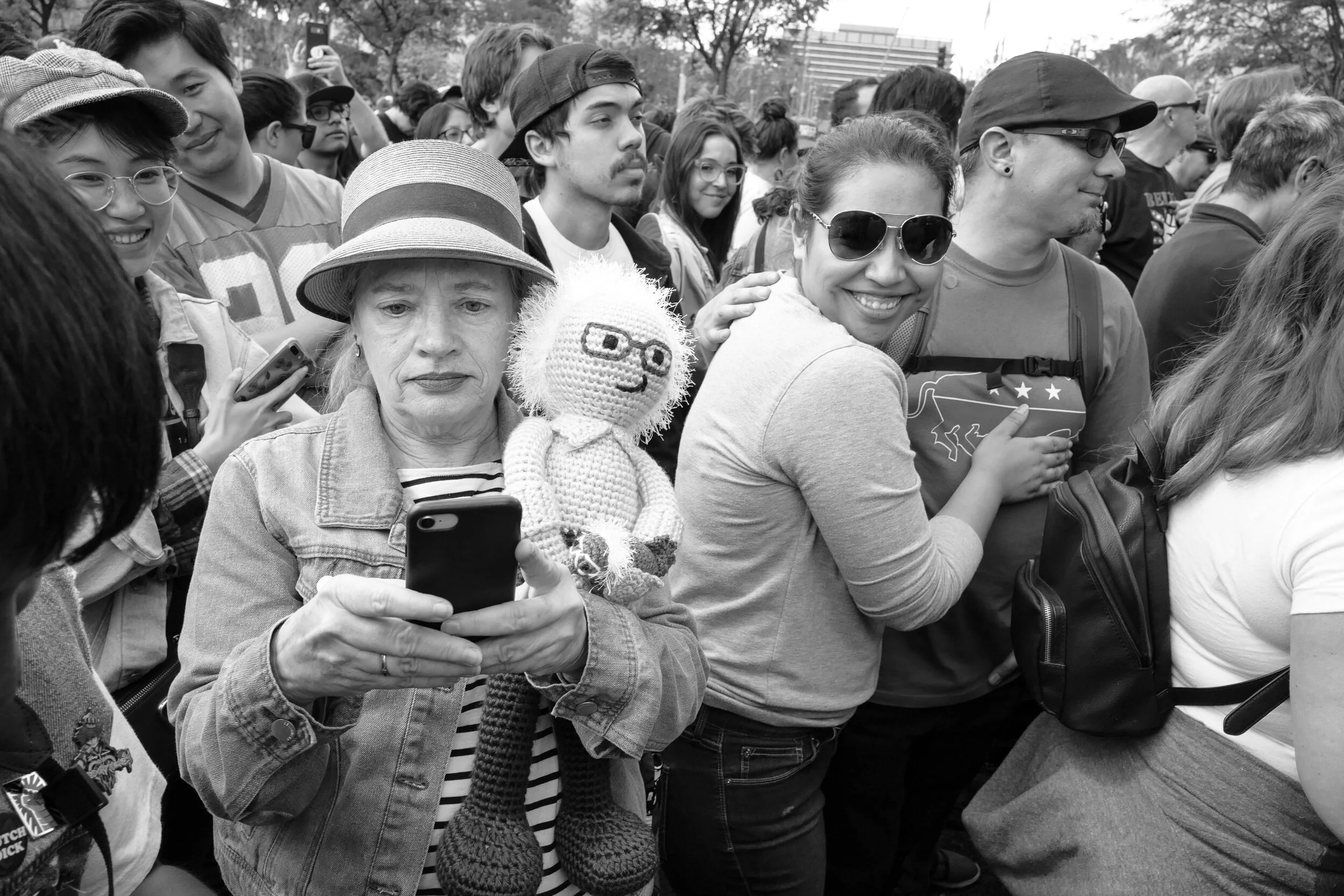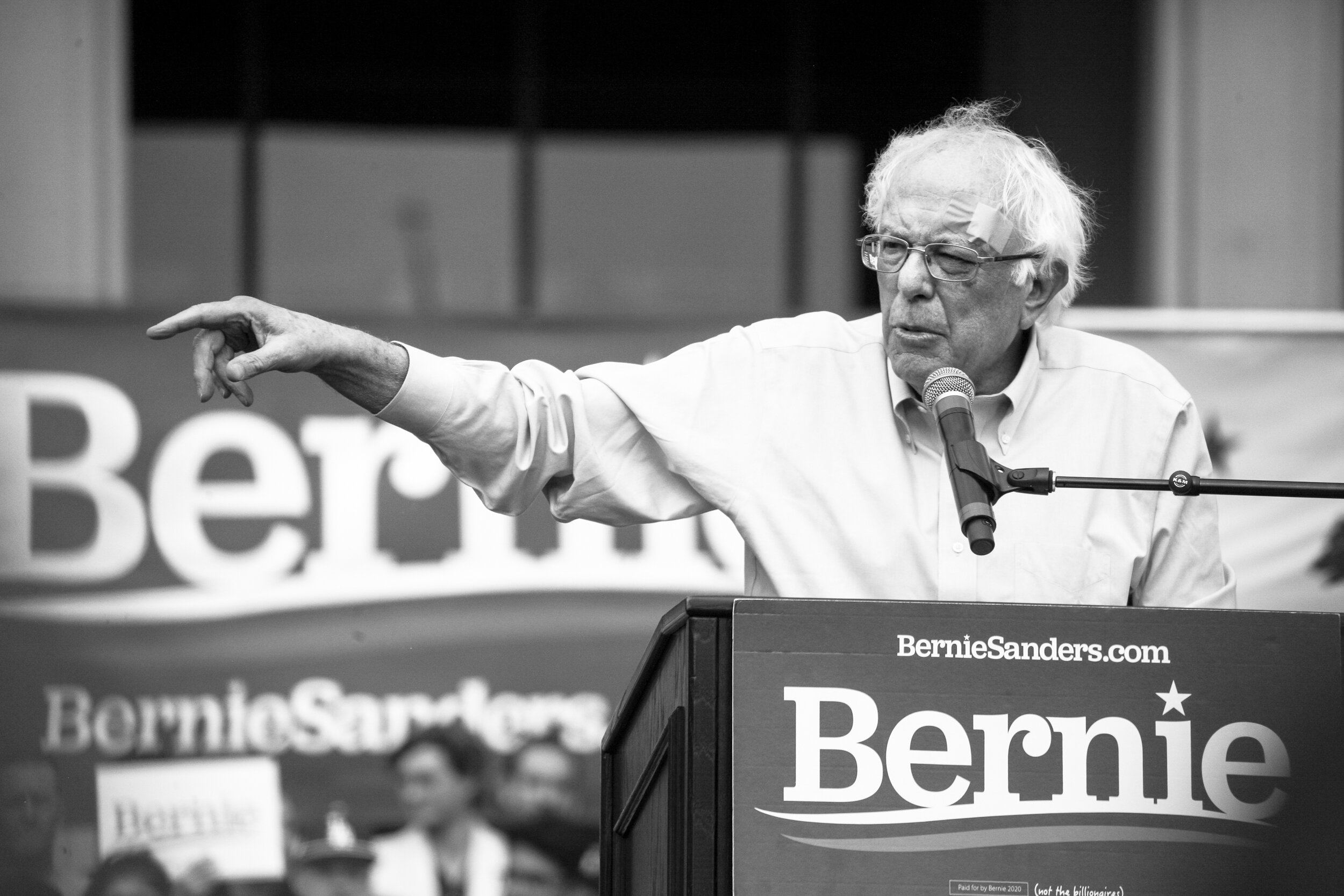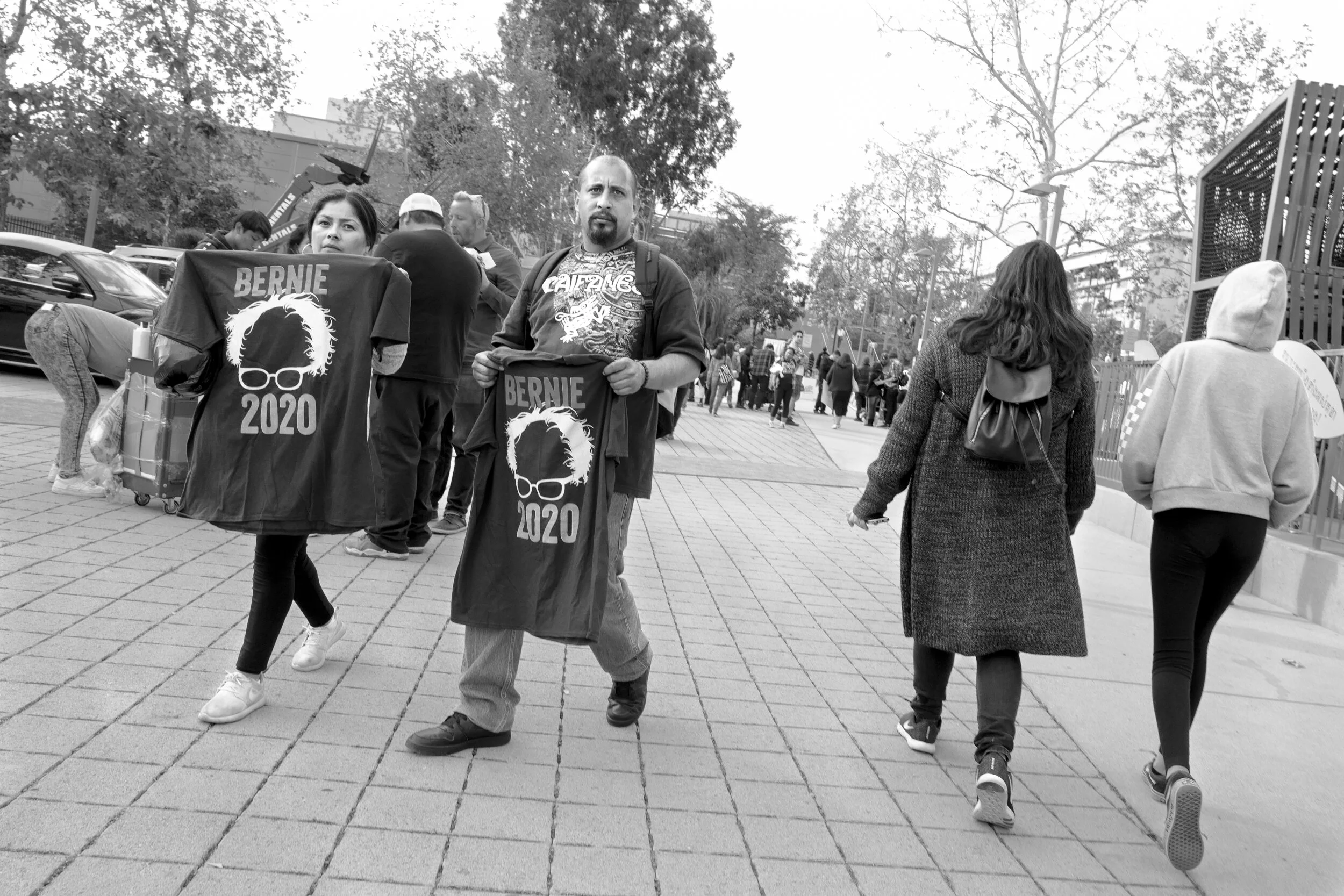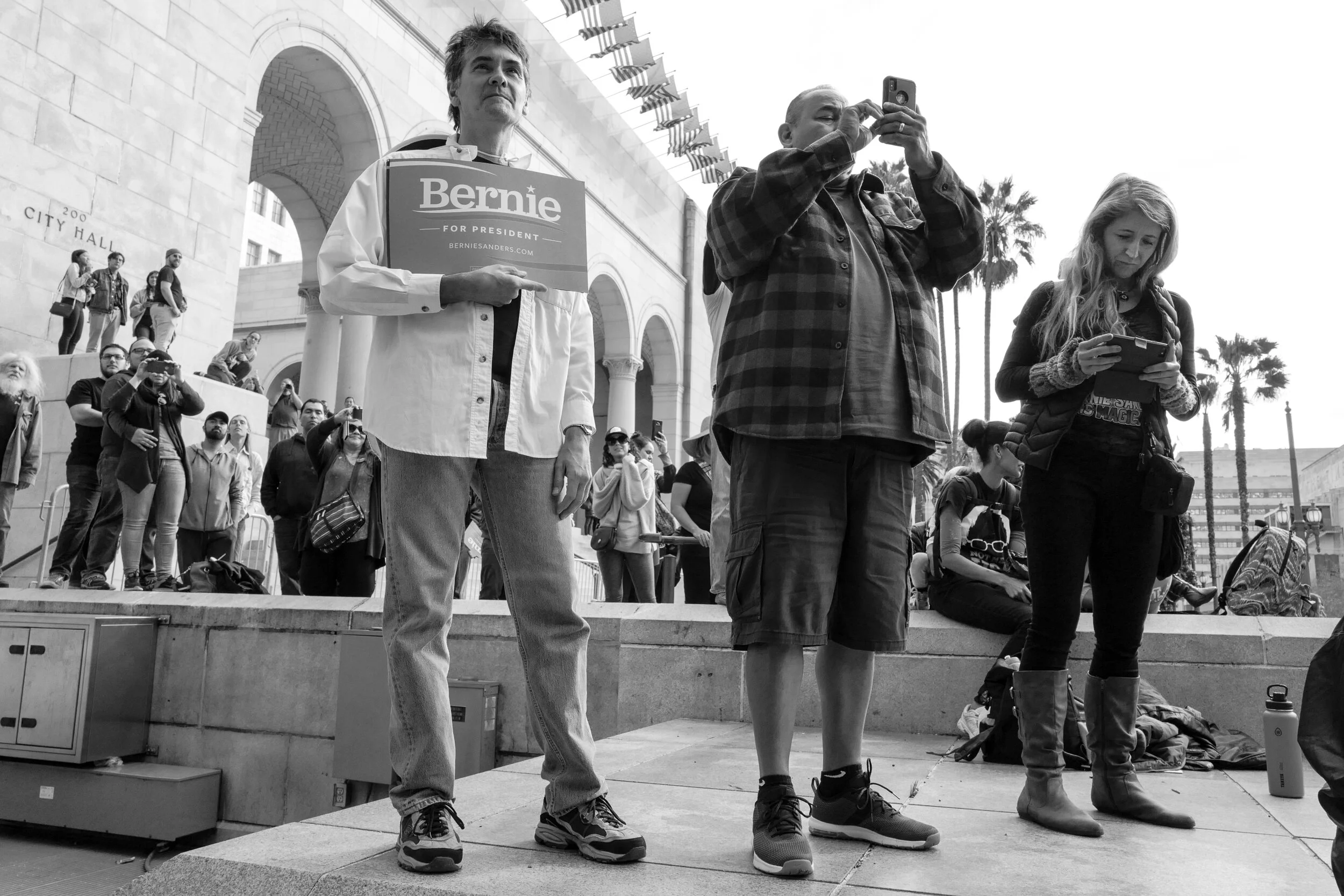Not Me. Us.
A Rally for the Presidential Candidacy of Bernie Sanders
Los Angeles, CA 2019
-text below gallery-





















Not me. Us.
June 20, 2020
The causes Bernie Sanders has been fighting for have not changed much in his decades of politics. Interviews of Sanders from before I was born seem like something he may have said last week. He is simultaneously one of the most beloved and contentious politicians in the country. In a handful of years, his policy ideas have gone from being perceived as radical or fringe to becoming mainstream talking points in our society.
His dedicated support has grown nationwide, existing among all American demographics, but none more than younger generations.
Many people of older generations may be surprised by the overwhelming love that comes from younger people for Bernie Sanders. And at face value, maybe the elderly, white, democratic socialist senator from Vermont is not an obvious figure for Millennials, and increasingly Gen-Zers, to rally their youthful, diverse and progressive enthusiasm around.
But all generations can surely agree that what Bernie Sanders is preaching and the way in which he preaches it is different from any mainstream American politician that has risen to prominence in some time, absolutely in the lifetime of recent generations. It seems older generations may more easily dismiss what Bernie preaches and represents as fringe politics, unrealistic idealism, too radical; but maybe most apprehension is due to Sanders being labeled a “Socialist,” even if technically a “Democratic Socialist.”
Preceding American generations grew up during the events of the Cold War, the Cuban Missile Crisis and the general societal boogie man of “communism,” and all terminology lumped into that category became un-American, “socialism” included. The immense power these terms held would allow them to be easily weaponized against Civil Rights leaders, war protestors, women’s rights advocates and labor leaders to demonize and discredit them for most of the twentieth century.
Previous generations also came of age absorbing news reports of the truly horrific atrocities of authoritarian communist regimes, but rarely ever received any corresponding coverage of the equally barbaric events conducted by right-wing authoritarian regimes—often with American support—in the name of “defeating communism.” The doctrine to “defeat communism,” at home and abroad, was one of perilous ambiguity.
Younger generations have had quite a different experience. They have come of age after the fall of the Berlin wall, the dissolving of the USSR and communist China becoming one of our largest trading partners, while we confusingly maintain an inhumane relic of an embargo on Cuba—which is laughable as any realistic threat to our nation. Movies such as “Red Dawn” and “Rocky IV” have provided an absurd glimpse back into the rhetoric of our childhood.
Younger generations seem more unfazed by the rhetoric of the past and they may be more receptive to the differences in these highly debated terms. It may also be clear to them that the democratic values that Bernie preaches are antithetical to the authoritarianism that rose out of the likes of Cuba and the former USSR. Many also seem to be aware that America has many “socialistic” or “social democracy” type programs that have been loved and embraced by American citizens for decades, such as Social Security, Medicaid and Medicare. Essential societal needs like libraries, public roads, public education, parks and even fire departments are all socialized institutions for the public good. It is also no coincidence, with exception of the last example potentially, that these public institutions have been under perpetual threat of defunding since the 1980s.
As the world has gotten smaller, younger people have become increasingly aware of the prevalence of Social Democracies abroad, where these ideas are embraced and have been integrated into some of the most progressive and democratic countries in the world: i.e. Denmark, Sweden, Norway. Even historically in the United States, Bernie Sanders’ positions are not so extreme in comparison to some of the economic and tax policies of revered presidents like Franklin Delano Roosevelt and Harry S. Truman.
Younger generations also seem to recognize the irony of those who wield the term ‘socialism’ as a weapon, understanding the sentiment of Martin Luther King Jr.’s quote responding to similar rhetoric: “The problem is that we all [too] often have socialism… for the rich… and rugged free enterprise capitalism for the poor.”
The largely unaccounted cost of the corporate welfare state in our country eclipses our social safety net. Our government officials, beholden to the power and money of corporate lobbyists, in many ways, run a protection racket, passing regulation and tax loopholes tailored to these same corporate entities and the whims of the ultra-wealthy who own them. This is all while these entities and ultra-wealthy simultaneously demand "deregulation" where it benefits them and the elimination of social safety-net "entitlements" for working people. The hypocrisy is outstanding.
“Socialism” in America has tactically been broadcast as taking away economic freedom and liberty, but never spells out whose “liberty” and “freedom” our system prioritizes. There is little freedom or liberty in having to work multiple jobs only to remain poor or being bound to your employment because of health insurance.
More than any of this, I believe younger generations embrace Bernie Sanders because what he says makes sense to them, whatever label you want to put on those ideas. Younger generations have been brought up in a political system that is increasingly dysfunctional and divergent from everything we were taught to believe it stands for: a government that represents and works for the people.
Millennials in particular came of age amongst the rhetoric of the post 9/11 world. Many attempted to begin their careers in the shadow of the Great Recession, many weighed down by student debt disproportionate to any generation prior, in an economy where upward mobility was, for many, bleaker than the ones immediately preceding them. The early hopes that came with their support of President Obama’s administration, despite their continued respect for the man himself, left many in disappointment and a developed distrust of the Democratic party’s corporate centrism.
Many people of younger generations see a pathway to a better future and will no longer hear it is unrealistic or even impossible, when we look around the world and see successful examples globally of universal health coverage, tuition free college, exceptional public schools, strong workers’ rights, living wages, an embracing of clean energy and democratic processes largely uncorrupted by corporate money. With the wealthiest 1% of American families now possessing fifteen times more net worth than the bottom 50% of Americans combined, they are no longer willing to accept a system where a small percentage of society extracts wealth at the expense of their friends and families’ well-being. In the “Greatest Country in the World” and positively the wealthiest, these things and more are obviously possible. Historically, we have led the world in many of them.
Of course, no generation is a homogenous monolith in its thinking and generations tend to change characteristics over time. There are also many currently among younger generations who hold polar opposite political viewpoints to everything I have described above. But as generations age (the oldest Millennials are approaching 40 years old), they do vote in much larger numbers and I believe that long after Bernie Sanders is gone, the work he has done and what he stands for will have permanently changed our political discussion and the minds of countless Americans.
As Bernie Sanders repeatedly would make clear in his speeches, this movement isn’t about him, it is about people uniting across all of America to fight for the political change they want to see in our country and the world. “Not me. Us.”
Joe Cortright, "Dr. King: Socialism for the rich and rugged free enterprise capitalism for the poor," City Commentary, 1/21/2019, https://cityobservatory.org/dr-king-socialism-for-the-rich-and-rugged-free-enterprise-capitalism-for-the-poor/
*2020, Updated statistics:
*Tommy Beer, "Top 1% of U.S. Households Hold 15 Times More Wealth Than Bottom 50% Combined", Forbes, 10/1/2020, https://www.forbes.com/sites/tommybeer/2020/10/08/top-1-of-us-households-hold-15-times-more-wealth-than-bottom-50-combined/?sh=235ab39c5179